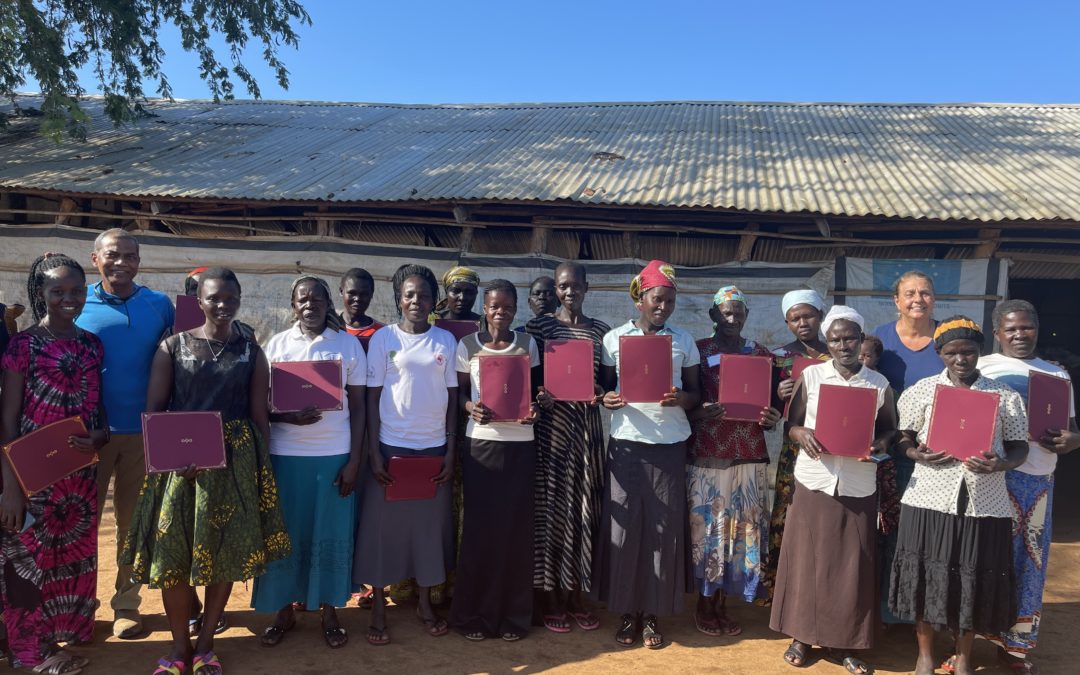Arun and I taught a business class in the camps. It was an hour and a half drive over dirt roads to get to the Morobi Refugee Camp Village, in Palorinya. As we got within a few miles of the camps, we began seeing refugees walking along the road. They start early and walk for hours to get to the markets. They purchase supplies in bulk, and pay for transport back. Then they sell their products in the local market. This is commerce in the refugee camps. As we entered the Morobi camp, we saw the U.N. compound, where each refugee gets the equivalent of three 5 lb bags of corn flour and some cooking oil for each family member per month. That’s it. Families end up selling part of their food to buy other necessities, medicine, or pay school fees. They plant crops on their small plot of land,  but there isn’t room to grow much. If there is a husband, they often leave to find work to help support their families. Sometimes they don’t return.
but there isn’t room to grow much. If there is a husband, they often leave to find work to help support their families. Sometimes they don’t return.
As we arrived at the church where we were to teach, we prayed that our class would be useful to these women. The church was framed with rough-hewed logs and wrapped in UN stamped plastic, the only building materials refugees are provided to build shelters. The women arrived, a few at a time, over the next hour. They were friendly, but quiet as we started handing out class materials and began our class. There was two tailors and one who sold used clothing. The rest sold a mixture of tomatoes, onions, beans, maize, ground nuts, silver fish, eggs, rice, salt, and sugar. Some produce they grew, but most they purchased in quantity and resold in smaller quantities in the local market.
As they shared about their businesses, Alice wanted to know how to keep her husband from taking her business money. Harriet wanted to know how to keep her grandkids from using the sugar she had to sell. Many wanted to know how to increase the number of products they sell, so they could better provide for their families.
By the second day, the women were there before we arrived, singing and clapping as we drove up to the church. Some of the concepts were simple, like keeping personal money separate from business money, or writing down every time money exchanged hands. Others, like determining the profit per product or setting a price for their products, was a bit harder. As the women gained understanding, you could see it on their faces. Sometimes they spontaneously clapped as the light-bulb came on.
Our curriculum was Bible based, and we used scripture to reinforce good business principles. The women actively participated in our daily devotion, reading passages out-loud in Bari, and participating in the discussion. I was grateful to God that I had the opportunity to hear Alice’s story of how she ended up supporting her sick husband, her two children and her husband’s first wife’s three children. I was able to encourage her and pray with her. Ester’s mother-in-law died the first day of the class, but she onlv missed one dav. was able to pray with her as well.
At the end of the class, we outlined the process that will be used to provide micro-loans to those who need funds to expand their businesses. It took a while for it to sink in that the 6% interest that will be charged is 0.5% per month vs the 10% per month going rate in the camps. They didn’t understand that at the end of the year the debt would be paid. The lenders in the camps only require the interest payment, but it never ends. When they realized this, they clapped and clapped.
It was tremendously rewarding to equip these women to better provide for their families. We are fortunate that Scovia, from our partner organization, is there to help these women, and to teach this class to others. Pray for these women, that they would strengthen and grow their businesses, and would give God the glory.

